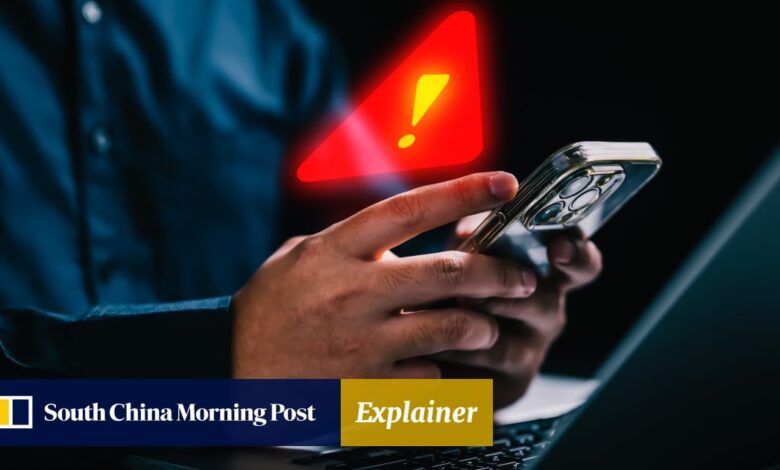How can you protect yourself from financial scams? What should you do if you fall victim?

Here, we cover the basic definitions and types of scams, some steps for response, the latest cases in Hong Kong and other Asian jurisdictions, and further resources.
What are fraud and scams?
While the terms fraud and scam are often used interchangeably, they refer to different forms of deception. Fraud involves unauthorised access to personal information, such as credit card or bank account numbers, through hacking or old-fashioned pickpocketing. Scams trick people into providing personal information via deceptive phishing emails, phone calls and social media accounts.
In short, fraudsters rely on illegal access, while scammers use psychological manipulation.
Last year, financial losses involving deception cases reported in Hong Kong nearly doubled to HK$9.18 billion (US$1.2 billion) compared with the previous year, with cases rising by 42.6 per cent to 39,824, according to police data.

The wave has continued this year, with the first five months recording an 80 per cent jump to HK$3.79 billion in losses compared with the same period last year.
Investment scams caused the most financial loss in 2023, with a gross loss of HK$5.9 billion. Impersonation scams ranked second with HK$1.65 billion lost, while scams related to jobs, e-commerce and impersonation of friends were among the top five.
Technology-related crimes losses rose 31 per cent to HK$2.66 billion in the first half of this year compared to the same period last year, with artificial intelligence being used to prey on victims, according to the Hong Kong Police Force.
What can you do after a fraud or scam takes place?
Frauds and scams present different legal implications, which affect how victims can attempt to recover financial losses.
Credit card companies and banks offer safeguards against unauthorised transactions, making it easier for victims to recover their fraud losses. These cases are often treated as serious indictable offences, with law enforcement agencies actively investigating and prosecuting them.
In contrast, scams, while also illegal, may not always result in criminal charges or successful prosecution due to the difficulty of identifying and arresting the scammers. Scam victims may find themselves with fewer options for recovering their money, especially because they may have provided personal information to the scammers.
Jonathan Crompton, a partner at law firm RPC, said the first thing to do after encountering a fraud or scam is to “act immediately” to notify the relevant banks and the police.
If the transaction involves US dollars, victims can contact the US Federal Bureau of Investigation (FBI). The FBI runs the Internet Crime Complaint Centre, which accepts reporting of suspected internet-facilitated criminal activity and disseminates investigative and intelligence information to law enforcement and for public awareness.
“If it’s a US dollar transaction that goes from one bank to another, it should pass through a correspondent bank in the US, meaning there’s a touch point for the US, and you can file a complaint with the FBI,” Crompton said. “The FBI is often very quick to respond and efficient at investigating fraud.”
Crompton said filing an injunction can also be an option. If a bank is served with an injunction, it is on notice not to allow transactions involving the defrauded funds to continue. However, applying for such a court order can be expensive.
“One tool that we use more frequently, particularly if it’s not a very high-value fraud, is to write a letter to banks notifying them that there has been a suspicious transaction,” he said. “We ask the banks to comply with their legal and regulatory obligations with regard to suspicious transactions and preventing fraud.”
What are some recent high-profile cases in Hong Kong?
One of the most talked-about scams this year involves deepfake images and voices. In January, a Hong Kong-based finance department employee of Arup, a UK-headquartered engineering company, transferred HK$200 million to a scammer after joining an online meeting that included a lookalike of the company’s chief financial officer, who asked for the transaction.
Last September, the HK$1.6 billion JPEX cryptocurrency scandal emerged as Hong Kong’s biggest alleged financial fraud case. The police have arrested more than 70 people in connection with it and frozen nearly HK$230 million in assets.
The JPEX scandal erupted after the Securities and Futures Commission named the cryptocurrency trading company an unlicensed platform and accused it of suspicious activities. According to the police, more than 53 per cent of the investment scam losses recorded last year were related to cryptocurrency.

“Virtual assets are emerging products, with volatile prices involving different risks,” according to the Investor and Financial Education Council, an independent public organisation and a subsidiary of the SFC. “Scammers are quick to take advantage of this situation and fabricate investment swindles that claim to offer high yields with low risks.”
Another virtual currency-related scam happened in May with 10 individuals separately reporting being defrauded by a syndicate that set up a virtual online platform.
The syndicate falsely claimed it could provide profitable speculation on tickets for webinars hosted by the scammers. They also offered high-interest deposit schemes to attract substantial investments, touting “high return, low risk” to lure victims.
How about other Asian jurisdictions?
Elsewhere in Asia, Singaporean police arrested 10 foreign nationals of mainland Chinese origin last August for their involvement in a S$1 billion (US$747 million) money-laundering and financial fraud case.
These individuals were charged with unlicensed lending in China and illegal gambling activities involving United Overseas Bank, as well as local units of Citigroup and RHB Bank, according to a Bloomberg report citing charge sheets. Using falsified documents, they also allegedly attempted to defraud Oversea-Chinese Banking Corp, Standard Chartered and CIMB Bank, the report said.
In Singapore, two suspects were accused of operating servers that infected victims’ Android mobile phones with a malicious Android Package Kit app since June 2023, enabling them to control the devices. The malicious app allowed the scammers to alter the contents of the victims’ phones, easing infiltration of their bank accounts.
Deepfake technology was used in a high-profile scam in China that came to light in May 2023. A businessman in Fuzhou transferred 4.3 million yuan (US$591,000) after receiving a video call from what appeared to be a trusted friend. The fraudster had stolen his friend’s WeChat account and used advanced AI face-swapping technology to impersonate the contact during the video call.
Where to find more resources against fraud and scams?
These elaborate fraud and scam cases underscore the urgent need for heightened awareness and regulatory measures to protect the public from such deceptive schemes.
“In light of an increasing trend in fraud incidents in Hong Kong and globally, the Hong Kong Monetary Authority and the Hong Kong Police Force have taken huge steps to detect, disrupt and deter scams,” said Lilian Sin, head of financial crime compliance services for Hong Kong at KPMG China. “This includes the introduction of five anti-deception initiatives and the ‘Scameter’ locally.”

The five anti-deception initiatives include real-time fraud monitoring, a bank-to-bank information-sharing platform, a suspicious proxy identifier alert model, enhancement of the 24/7 stop payment mechanism and help with the police force’s investigation work.
Scameter, launched by the police in September 2022, is a one-stop search engine that helps people identify suspicious web addresses, emails, platform usernames, bank accounts, mobile phone numbers and IP addresses. The public can access it through the CyberDefender website or app to check for suspicious or fraudulent schemes.
The use of Scameter will be expanded on Sunday to cover internet banking and transactions at physical branches so that users will receive alerts when transferring funds to suspicious accounts. Previously, only suspicious transactions made via the Faster Payment System received warnings.
When in doubt, the public is encouraged to call the all-day inquiry hotline Anti-Scam Helpline on 18222, which is operated by the Anti-Deception Coordination Centre (ADCC), part of the police force.
Citizens can refer to the ADCC website for the latest scam trends and types.
Additional reporting by Mark Gong
Source link



